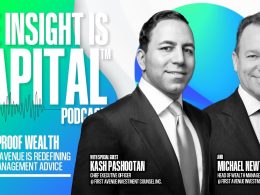5 Ways to Get Media Attention
by Commonwealth Financial Network
 I could say “dress up like a clown” and you’d have more attention from the media—and your firm’s Compliance department—than you could handle. I think this illustrates a valid (and somewhat sad) point in our viral video world: It takes work to get positive media coverage but next to no effort at all to gain the opposite. Reporters are pressed for time and can’t cover every story that crosses their desks. They’re competing for clicks over an ever-expanding list of alternative news sites/sources, and there is limited space in print issues, which continue to shrink, are merged with sister publications, or are eliminated altogether. So, in today’s world, what are the most effective ways to get media attention?
I could say “dress up like a clown” and you’d have more attention from the media—and your firm’s Compliance department—than you could handle. I think this illustrates a valid (and somewhat sad) point in our viral video world: It takes work to get positive media coverage but next to no effort at all to gain the opposite. Reporters are pressed for time and can’t cover every story that crosses their desks. They’re competing for clicks over an ever-expanding list of alternative news sites/sources, and there is limited space in print issues, which continue to shrink, are merged with sister publications, or are eliminated altogether. So, in today’s world, what are the most effective ways to get media attention?
If your resolution for 2017 is to boost your credibility through select marketing efforts, we can help! You may need to work that much harder, but these tips will help you work smarter.
Being pleasant to deal with makes people want to get in touch with you. After all, that’s one of the reasons your clients stay with you, right? Be generous with your time if reporters need it. If you’re always glad to hear from them, it increases the chances that they’ll contact you again.
If you’re the one reaching out to a reporter, what should you do if your attempts at making contact are ignored? Don’t get discouraged! Instead, be prepared for the reality that your press releases will not always get picked up and your calls to pitch story ideas will sometimes be disregarded. You’re in the business of building relationships through your interactions with your clients. The media is no different; you have to prove your worth to them. It could take three weeks for someone to call you, or it could take three years. It’s not about instant gratification but rather being the first name in the reporter’s mind when she needs a source.
To help illustrate this point, just look at what studies reveal about advertising:
- People forget an ad after seeing it once.
- After seeing an ad 9 times, people tend to develop a curiosity about a brand.
- After 15 or so exposures, consumers start to develop a positive feeling about the brand.
I’m not saying that 9 and 15 are the magic numbers of contact here, or that after 16 attempts you have to hire a press agent. As they say, your experience may vary, but I think you get the idea.
It may sound self-evident, but you have to let the media know that you are available as an expert in your field. Start by sending them a bio and a background news release about your firm, or take on a current issue. Later, follow up with links to other articles that feature you. If you author a blog or publish a regular newsletter for your clients, add your media contacts to the distribution list. Use your Twitter account to your advantage here. You’ll want to follow the contacts you’d like to build relationships with and engage with their posts on relevant topics by either commenting on their post or sharing something you find particularly compelling—they’ll take note of your activity. The key point here: continually keep your name in front of the media.
As with your other media efforts, you won’t always get an immediate response. Sooner or later, though, if you have properly matched your expertise to the needs of the correct people in the media, somebody will contact you to get a quote. When this happens, be sure to:
- Include links to your recent interview in your next newsletter
- Post the resulting story to your social media pages (tagging the publication and reporter, of course)
- Add it to the “News” tab on your website
These simple steps will build credibility among clients, strategic alliances, prospects, and media alike. Reporters have a pack mentality. If they see you’re a wanted source for someone, they’ll want you next.
Conducting surveys is a great way to measure the effectiveness of your services. But when you do, it’s important to announce it. That way, you might even get featured twice—once when you announce the survey and a second time when you announce the results.
Another way to promote yourself and your business is to sponsor a community event. You might get interviewed for an article about it, and it may even gain you new prospects. Even if none of this occurs, however, you will have new material to write or blog about, which allows you to continue to develop yourself as a thought leader and amass a portfolio of written work.
Most newspapers—online and print—publish events calendars. Offering a seminar? Submit details along with a brief description to the publication. Join your town’s “bulletin board”—local reporters are always looking to keep an ear to the ground, so it’s likely they will see your news. You might even take it one step further, inviting select media to attend an event to hear your expertise firsthand.
Many newspapers are members of one or more wire services and use them to provide their readers with national news and features. An Associated Press (AP) story that moves on the national wire is available to all 1,400 of AP’s U.S. daily newspapers—and has the potential to be picked up by many of them. It’s a quick and relatively easy way to get your national coverage for your story.
Here, a good place to start is with a reporter at your local newspaper. Once your local paper publishes a story, especially if it’s a good one, encourage the reporter or the editors to put the story over the wire. Keep in mind that it’s in their interest to do so. It gives prestige to their work, and everyone likes a win-win situation. If your local newspaper does the story but it doesn’t get over the wires, you also have the option of reaching out to the local or regional bureaus for these news services (e.g., the AP, United Press International, and Thomson Reuters).
Of course, these are just a few tips to get you started. Want to learn more? Stay tuned for our upcoming blog post featuring even more ways to get media attention.
Have you established relationships with local reporters? What other ways do you get media attention? Please share your thoughts with us below!
Commonwealth Financial Network is the nation’s largest privately held independent broker/dealer-RIA. This post originally appeared on Commonwealth Independent Advisor, the firm’s corporate blog.
Copyright © Commonwealth Financial Network
















